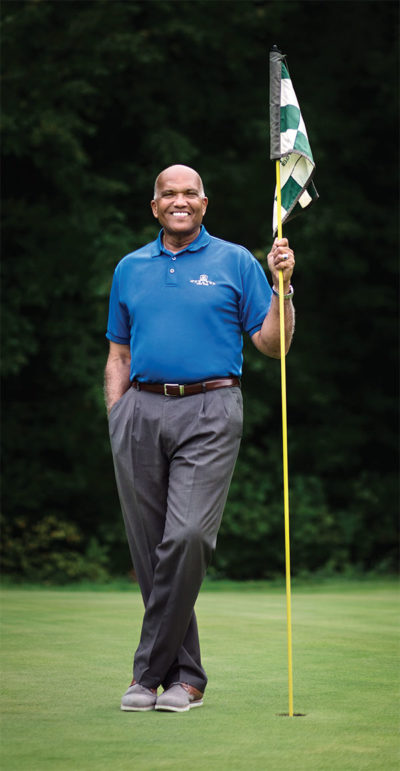The Marlton Golf Club in Upper Marlboro, Maryland, is one of only a handful of black-owned golf courses in the U.S. Henry Turner, MBA’89, Marlton’s CEO and a co-owner, hopes to attract a diverse group of golfers, especially younger people, to the public course. “A lot of African-American children have never had the opportunity to play golf,” says Turner. A Gulf War veteran who is part of a proud military family, Turner has lived a varied life, spending time as a defense contractor, land developer, and community volunteer. An admission? He hasn’t swung a golf club much.

Photo: Ryan Donnell
Henry Turner, MBA’89
How’s your golf game? Do you play a lot?
I don’t. I’m just starting to pick up the sport now. I actually bought the course for land development. But after buying it and seeing its value to the community, I decided to keep it. My wife is from Mississippi. In the early 1990s, we were looking for property to build a house there. A Realtor was showing us around. It was a very nice neighborhood with a golf course. I said, “I want to go over there and play.” He said, “You won’t go over there and play at that golf course.” I forgot I was in Mississippi. Now I don’t need that golf course. I have my own. We are open to everyone. Our fees are the lowest in the area.
What are your hopes for Marlton?
I want the younger population to realize that business owners use the golf course as a way to conduct high-level business. There is not one deal struck on the football field or basketball court. Every day there is a business deal struck on the golf course.
What has the military meant to your family?
Our father spent over 30 years in the military. He started in the segregated army, got his optometry degree, and went back into the Army as an optometrist. The military gave him an opportunity, an opportunity the rest of society didn’t give minorities. My two brothers and I went to West Point, my sister went to the Naval Academy. All of us spent 20-plus years in the military. The military is a wonderful thing. It paid for our education. My wife, Winifred, served 22 years in the Army and retired as a lieutenant colonel. Our oldest son is a major in the Army. Service is important to our family. So much has been given to us. There comes a time when you have to give back.
What’s an essential lesson the Army taught you?
If you take care of your soldiers, your soldiers will take care of you. That’s the biggest thing I learned in the military. And I took that into the civilian world. If you take care of your employees, your employees will take care of you.—John Crawford
